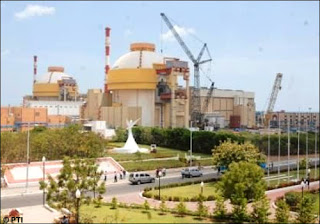My letter to The Hindu (28-02-2012) on Koodankulam Issue
Dr. Singh's remarks are aimed at intimidating civil rights activists and gagging the voice of dissent. It is clear that people in and around Kudankulam are no longer content with the argument that the country's energy security is dependent upon the nuclear option. Hurling baseless charges against civil society activists and creating an emergency-like situation over the issue will not help relieve the tension that is building up in Tamil Nadu. Notwithstanding the assurances given by nuclear energy proponents, the local population's fears are well-founded. The awareness on the issue is good and people pose pertinent questions to the government. Ecological and civilian safety is not something they will compromise on.
In response to the Editorial ‘Engage, don't vilify’ in The Hindu (27-02-2012)
Prime Minister Manmohan Singh's remarks about foreign-funded NGOs stalling the introduction of genetically modified food and the commissioning of the Kudankulam nuclear power project are bound to be taken seriously by his supporters and detractors alike. For, they do not merely represent an uncharacteristic venture by him into controversial territory, but may indicate his government's growing frustration over its plans running into fierce ideological opposition. When Dr. Singh, who has a reputation for reticence on sensitive subjects, drops dark hints about a foreign hand, it is surely something that needs to be substantiated and, if necessary, followed up with action. As if to bolster his argument, the licences of three NGOs have been cancelled and the foreign remittances received by them are being investigated. Meanwhile, the People's Movement Against Nuclear Energy, the organisation spearheading the anti-Kudankulam protests, has rejected the charge and demanded the Prime Minister substantiate his remarks. Adding to the mix, Jairam Ramesh has also clarified that his decision as Environment Minister in 2010 to place a moratorium on Bt Brinjal was not influenced by NGOs, but was based on objective factors.
Dr. Singh cannot be faulted for his view that science and technology should serve as instruments for raising the standard of living of the people, and it is entirely understandable that he wants everyone, including his critics, to appreciate the development challenges faced by India and its energy requirements. At a time when agriculture badly needs infusion of technology and when a chronic power shortage is crippling economic activity in States such as Tamil Nadu, it is hardly surprising that the government looks at all opposition to genetic engineering and nuclear power as suspect. However, the idea that NGOs with ‘foreign' links are fuelling the protests seems more expedient than convincing. The charge is also, at some level, quite irrelevant. For what it's worth, tens of thousands of ordinary Indians around Kudankulam, Jaitapur and other areas where reactors will be sited are apprehensive about what the placement of large nuclear installations in their backyard might mean for their health, environment and livelihood. The government needs to engage with them in a transparent and constructive manner and allay their fears with facts and arguments rather than innuendo and slander. The same is true for those sections of the farming and scientific communities who want a careful review of the consequences of genetic engineering before its indiscriminate adoption in the country. Their concerns are best answered by science and reason, not the implied threat of a midnight knock.

No comments:
Post a Comment